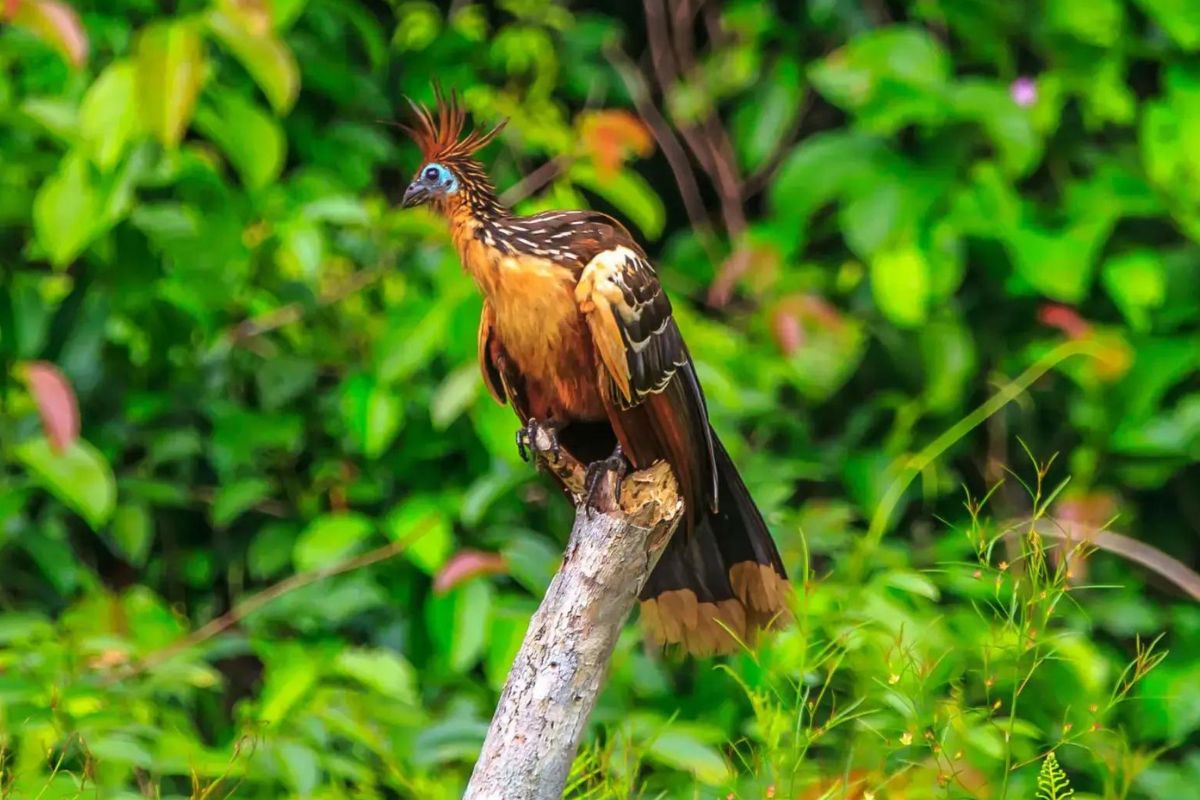Secrets Of Hoatzin Habitats In Ancient Palms

Have you ever wondered where the Hoatzin lives? This unique bird, often called the "stinkbird" due to its distinct smell, thrives in some of the most fascinating habitats on Earth. Found primarily in the swamps, mangroves, and riverine forests of the Amazon and Orinoco basins, the Hoatzin prefers areas rich in ancient palms. These environments provide the perfect setting for their leafy diet and nesting needs. Unlike many birds, Hoatzins have a digestive system similar to cows, allowing them to ferment vegetation in their crop. This quirky bird's home is as unique as its lifestyle, making it a true marvel of the natural world.
Discovering the Hoatzin: A Unique Bird
The Hoatzin, often called the "stinkbird" due to its unique odor, is a fascinating bird found in the Amazon and Orinoco basins. This bird is known for its ancient lineage and peculiar characteristics. Let's explore some of the best places to observe these intriguing creatures in their natural habitats.
1. Amazon Rainforest, Brazil
The Amazon Rainforest, a vast and diverse ecosystem, is home to many Hoatzins. This region offers a perfect environment for these birds, with its dense vegetation and numerous waterways.
- Manaus: A gateway to the Amazon, Manaus provides access to several Hoatzin habitats. Guided tours often include bird-watching excursions.
- Anavilhanas Archipelago: This area, with its myriad islands and channels, is a prime spot for observing Hoatzins in their natural surroundings.
2. Orinoco Delta, Venezuela
The Orinoco Delta, a labyrinth of rivers and wetlands, is another excellent location for spotting Hoatzins. This delta's rich biodiversity makes it a haven for bird watchers.
- Tucupita: The capital of the Delta Amacuro state, Tucupita offers boat tours that navigate through Hoatzin habitats.
- Caño Manamo: This river, part of the delta, is known for its abundant wildlife, including Hoatzins.
3. Pacaya-Samiria National Reserve, Peru
Pacaya-Samiria National Reserve, one of Peru's largest protected areas, is a biodiversity hotspot. The reserve's flooded forests and swamps create ideal conditions for Hoatzins.
- Nauta: A small town near the reserve, Nauta serves as a starting point for expeditions into Hoatzin territory.
- Yanayacu-Pucate River: This river within the reserve is a popular site for bird-watching tours focused on Hoatzins.
4. Cuyabeno Wildlife Reserve, Ecuador
Cuyabeno Wildlife Reserve, located in the Ecuadorian Amazon, is renowned for its rich wildlife. The reserve's lakes, rivers, and forests provide a perfect habitat for Hoatzins.
- Laguna Grande: This large lake within the reserve is a prime spot for observing Hoatzins, especially during boat tours.
- Cuyabeno River: The river's winding course through the reserve offers numerous opportunities to spot these unique birds.
5. Mamirauá Sustainable Development Reserve, Brazil
Mamirauá Sustainable Development Reserve, a protected area in the Brazilian Amazon, focuses on sustainable conservation. The reserve's flooded forests are ideal for Hoatzins.
- Tefé: A town near the reserve, Tefé is a common starting point for eco-tours into Hoatzin habitats.
- Uakari Floating Lodge: This eco-lodge within the reserve provides guided tours that often include Hoatzin sightings.
6. Yasuni National Park, Ecuador
Yasuni National Park, a UNESCO Biosphere Reserve, is one of the most biodiverse places on Earth. The park's varied ecosystems support a wide range of wildlife, including Hoatzins.
- Coca: The main access point to Yasuni, Coca offers numerous tour options for exploring Hoatzin habitats.
- Napo River: This major river within the park is a hotspot for bird-watching, with many opportunities to see Hoatzins.
7. Tambopata National Reserve, Peru
Tambopata National Reserve, located in the Peruvian Amazon, is known for its incredible biodiversity. The reserve's mix of forests and wetlands makes it a great place to find Hoatzins.
- Puerto Maldonado: The gateway to Tambopata, Puerto Maldonado offers various tours that include Hoatzin sightings.
- Tres Chimbadas Lake: This lake within the reserve is a popular spot for observing Hoatzins, especially during early morning or late afternoon tours.
8. Manu National Park, Peru
Manu National Park, another Peruvian gem, is a UNESCO World Heritage Site. The park's diverse habitats, from lowland rainforests to Andean highlands, support a wide range of species, including Hoatzins.
- Boca Manu: A small village near the park, Boca Manu serves as a launch point for expeditions into Hoatzin territory.
- Cocha Salvador: This oxbow lake within the park is a prime location for spotting Hoatzins, often seen perched on branches near the water.
The Hoatzin's Unique Home
Hoatzins thrive in ancient palm habitats. These birds, often called "stinkbirds," have a unique digestive system that ferments leaves. This process gives them a distinct odor, but it also allows them to eat what other birds can't. Ancient palms provide the perfect environment with their dense foliage and abundant food sources. These trees also offer protection from predators.
Understanding the connection between hoatzins and ancient palms highlights the importance of preserving these habitats. Deforestation and habitat loss threaten both the palms and the birds that rely on them. Protecting these areas ensures the survival of hoatzins and maintains the balance of the ecosystem.
Next time you see a hoatzin, remember its home in the ancient palms. This relationship is a reminder of nature's delicate balance and the need to protect it for future generations.

